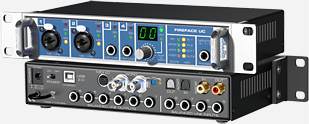FireWire & USB
- Overview
- MADIface XT
- MADIface USB
- MADIface Pro
- Babyface Pro
- Fireface UCX
- Fireface UC
- Fireface 802
- Fireface UFX II
- Fireface UFX+
- Digiface USB
- Digiface AVB
- Digiface Dante
more information
Fireface UC System Compatibility:
General Information
The following pages present the results of compatibility tests carried out by a number of users of the Fireface UC prior to general sales start. In the interest of clarity, only the most important information is shown here, while details can be found in the RME Forum
The results of these tests can be summed up as follows:
Mac OS X
Exceptional performance on par with PCI. Buffer sizes down to 32 samples can be used in practice with CPU loads close to 100%. There are two reasons: Most Mac Intel hardware is up to date, and works quite well with USB on a hardware level. Furthermore, Apple did a good job with USB Audio, ensuring great performance and stability inside OSX and Core Audio. Microsoft could well take a page from Apple's book here...
Windows
USB 2.0 can be found on Wintel machines since 2002, but the first generations of USB controllers did not work quite as well as required for realtime audio. Although PCs from around 2003 (e.g. Intel 875 with P4 CPU) work well with the Fireface UC in principle, a simple stereo playback already causes a CPU load around 30%. Latencies below 256 samples are not always click-free even with small applications. Close examination revealed that this CPU load is in fact a hidden DPC latency. Apparently, the interface chip works inefficiently, and causes wait states for the CPU.
This behaviour occurs regardless of the driver and operating system. Intel seem to have identified the problem with the ICH7. Modern PCs with ICH8, 9, and 10 exhibit an excellent USB performance in principle, and mostly feature Core 2 Duo CPUs, assuring ample processing power. Current Netbooks usually feature ICH7 controllers, ensuring general compatibility, but the slow Atom CPU causes a fairly high load even with simple stereo playback, which is often also the case with the internal sound chip. Older AMD and ATI based PCs frequently have disastrous USB interfaces, which prove to be totally incompatible with the Fireface UC.
Based on the above findings, and to avoid any disappointment for our customers, the system requirements for full operation of the Fireface UC have been strictly set to at least a Core 2 Duo CPU, which is mostly accompanied by recent USB controllers. Older PCs may work, as shown in our list, but with certain restrictions. Whether or not these are acceptable is something each customer can only decide for himself.
In short: The Fireface UC is a brand-new product of the year 2009, i.e. with latest technology, and works best with current computers.
All Windows versions from XP SP2 will work, since SP2 featured improved USB support. On the Mac, Mac OS X 10.5 is required, since the Fireface UC uses certain OS functionalities which did not exist in earlier versions.
But even the latest computer may fail if it is ill-configured. This applies to notebooks mostly, whose default configuration is often insufficient, which can not be significantly improved without special driver or BIOS updates. This not only affects the Fireface UC, but any audio interface.
Comments on the compatibility statements
Achievable performance (and the subsequent degree of compatibility) is classified in three categories.
- Compatible (everything works, occasional clicks require further computer optimization)
- Compatible with limited performance (older computers with increased CPU load)
- Not compatible
Users were asked to specify the lowest usable latency in practice. Since various users' applications are different, there may be varying statements for similar computer hardware. Large projects with high CPU load require higher latencies. On the other hand, a statement of 256 samples does not mean that smaller projects might not work well with lower latencies.
Many of the notebooks listed only reach good performance after massive system tuning (true for any audio interface). Details can be found on the RME Forum.




